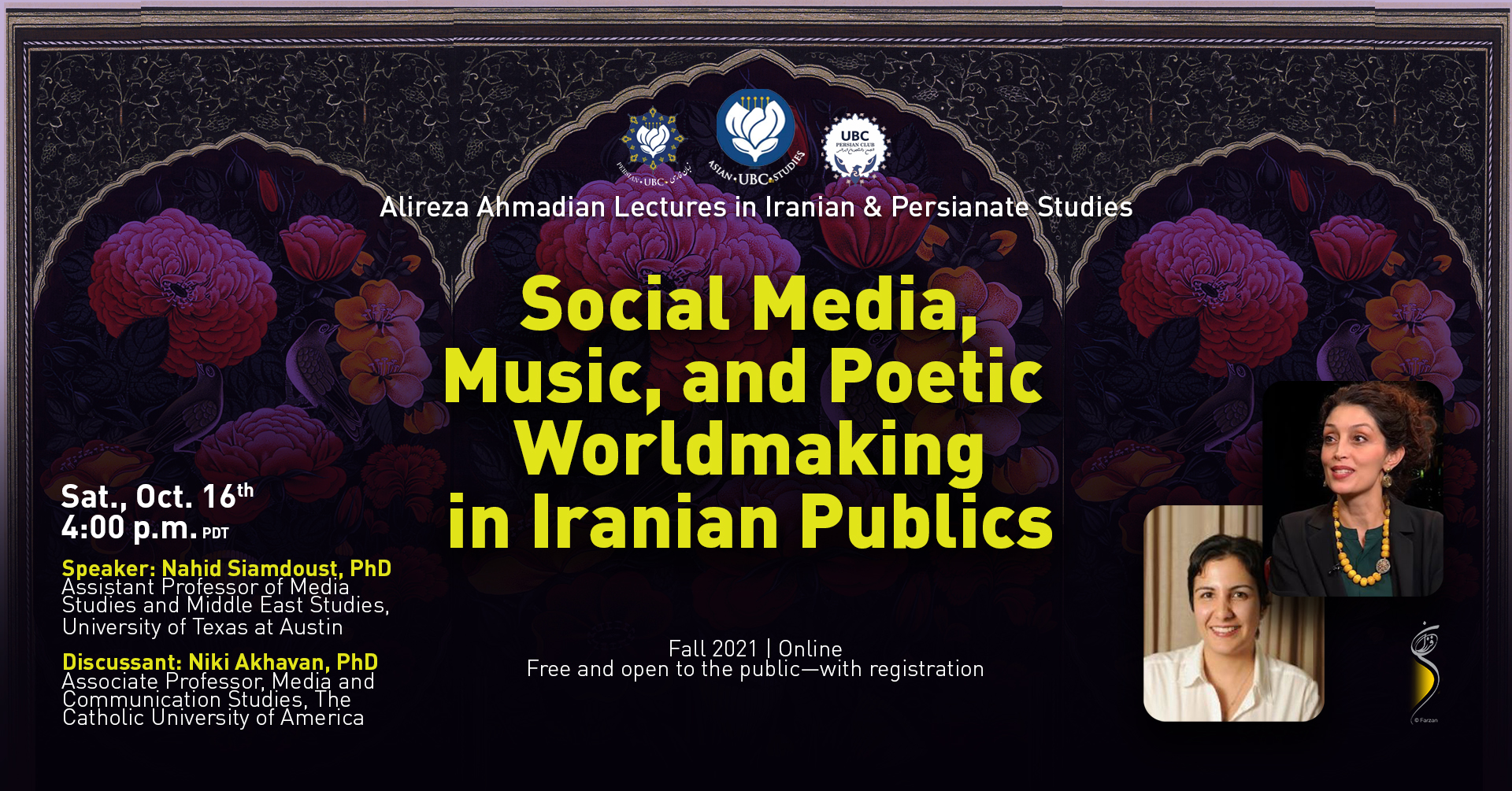

Poster design by Farzan Kermani
رسانههای اجتماعی، موسیقی و جهانبرسازیِ شاعرانه در سپهرِ عمومیِ ایران
سخنران: دکتر ناهید صیامدوست، استادیار مطالعات رسانه و مطالعات خاورمیانه، دانشگاه تگزاس در آستین
طرفبحث: دکتر نیکی اخوان، دانشیار، مطالعات رسانه و ارتباطات، دانشگاه کاتولیک آمریکا
مدتهاست که موسیقی در سپهر عمومیِ ایران نقش یک کانال مهم را برای میانجیگری اجتماعی و سیاسی بر عهده داشته است. در این سخنرانی، دکتر ناهید صیامدوست به بررسی نقش موسیقی در خلق شاعرانهٔ جهانهای بازنمودی، ابزاریسازی شادی هم در درون این جهانبرسازیها و هم در کاربستهای آنها و تأثیر رسانههای اجتماعی – و امنیتیسازی فضاهای آنلاین – بر روی این فرایندها میپردازد.
Music has long served within Iran’s public sphere as an important channel for social and political mediation. In this talk, Dr. Nahid Siamdoust will examine the role of music in the poetic creation of representational worlds, the instrumentalization of joy both within these worldmakings as well as their cooptations, and the impact of social media – and the securitization of online spaces – on these processes.
Guest Speaker:
Nahid Siamdoust, PhD – Assistant Professor of Media Studies and Middle East Studies, University of Texas at Austin
Dr. Siamdoust’s first large research project culminated in her book Soundtrack of the Revolution: The Politics of Music in Iran (Stanford, 2017). It is a fine-grained study of musical discourses and media use in the constitution and development of the public sphere in the Islamic Republic of Iran. Researched in Iran over a period of seven years, Soundtrack of the Revolution broke new ground by demonstrating the minute but powerful ways in which works of cultural production, and their multi-layered mediations, can register dissent and create political alignments within an authoritarian political sphere, but also of power’s productive abilities to shape forces in its own image. By centering a discussion of media and its importance in 20th century Iranian politics, it contributes to a growing literature that claims popular culture and media as key sites of analysis across the Middle East. Soundtrack of the Revolution was based on her doctoral dissertation, which won both the Middle East Studies Association’s Malcolm H. Kerr dissertation prize and the Douglas Leigh Memorial prize from the British Society for Middle Eastern Studies (BRISMES) for best dissertation in Middle Eastern Studies. Her new research project examines the role of various media technologies in the constitution of poetic worldmakings among Iranian publics in post-1979 Iran, with a special view to performances and discussions around “joy,” and the centrality of women in these discourses. Here she is investigating the emergence of both analog and digital collectivities and their positionalities vis-à-vis state-imposed dogmatic religiosity, placing analysis of social and transnational media impact at the core of this research. As a member of the Provost’s Cluster in Global Media Flows and (Dis)Information, Dr. Siamdoust is also investigating in a separate project the productive entanglements between rightwing creators of conspiracy and disinformation campaigns in the US and transnational “Iran regime change” advocates. Her writing has been published in The New York Times, Foreign Policy, Der Spiegel, and Jadaliyya, among others, and she regularly appears on English, German and Iranian media.
Discussant:
Niki Akhavan, PhD – Associate Professor, Media and Communication Studies, The Catholic University of America
Dr. Akhavan’s research interests include: new media and transnational political and cultural production; international cinema and national identity; state sponsored and oppositional propaganda; documentary and social change; post-colonial and critical theory; Iranian cultural studies. Dr. Akhavan is the author of Electronic Iran: The Cultural Politics of an Online Evolution (Rutgers, 2013).
Should you have any questions, please contact the Department of Asian Studies at Asian.Studies@ubc.ca.